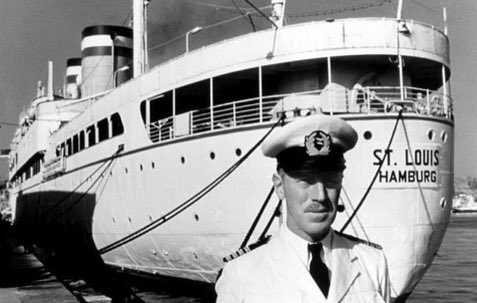
The #Righteous during World War Two
GUSTAV SCHRÖDER:
The German Sea Captain Of The “Voyage Of The Damned”
In May 1939, the ship St. Louis set off from Hamburg en route to the Americas. But this was no normal voyage.
GUSTAV SCHRÖDER:
The German Sea Captain Of The “Voyage Of The Damned”
In May 1939, the ship St. Louis set off from Hamburg en route to the Americas. But this was no normal voyage.

The ship, packed with over 900 Jewish refugees, was a last-ditch effort for many to escape the Nazis.
Some of the families had paid hundreds of dollars (thousands in today’s money) to secure a visa from the Cuban Embassy in Berlin. And they put their trust in
Some of the families had paid hundreds of dollars (thousands in today’s money) to secure a visa from the Cuban Embassy in Berlin. And they put their trust in
Captain Gustav Schröder to get them there.
Schröder, an experienced seaman, paid special care to his Jewish passengers. He ordered his crew to treat the families with courtesy and care — a sharp contrast to the hostility toward Jews in much of Germany.
Schröder, an experienced seaman, paid special care to his Jewish passengers. He ordered his crew to treat the families with courtesy and care — a sharp contrast to the hostility toward Jews in much of Germany.
The captain also allowed the Jewish families to have Friday night prayers in the ship’s main dining room. And, while they prayed, he allowed them to take down the large portrait of Adolf Hitler normally affixed to the wall.
But even though the St. Louis sailed to Cuba without

But even though the St. Louis sailed to Cuba without


much trouble, its passengers weren’t able to find salvation in Havana.
After the refugees arrived in Cuba, officials turned them away. For seven days, Schröder tried to sway them to accept the refugees, but they still refused. The St. Louis then attempted to drop off the refugees
After the refugees arrived in Cuba, officials turned them away. For seven days, Schröder tried to sway them to accept the refugees, but they still refused. The St. Louis then attempted to drop off the refugees
in Florida — but American officials there also refused them entry.
Shocked and horrified, the passengers believed that they had no choice but to return to Germany. But Schröder refused to give them up to the Nazis.
Though he considered wrecking his ship on the English coast —
Shocked and horrified, the passengers believed that they had no choice but to return to Germany. But Schröder refused to give them up to the Nazis.
Though he considered wrecking his ship on the English coast —
thus forcing the British to intervene — Schröder eventually found another solution. Belgium, Great Britain, and France each agreed to take in a number of the desperate families. None of them would have to return to Germany.
Despite this, some 250 of them still tragically perished as the Nazis tightened their hold on Europe. But those who survived never forgot the kindness and quiet courage of their ship’s captain. In 1993, Yad Vashem recognized Gustav Schröder as Righteous Among the Nations.
• • •
Missing some Tweet in this thread? You can try to
force a refresh


















